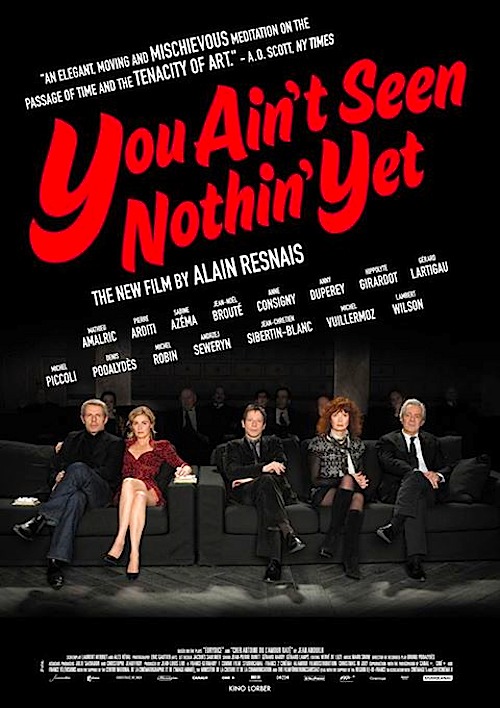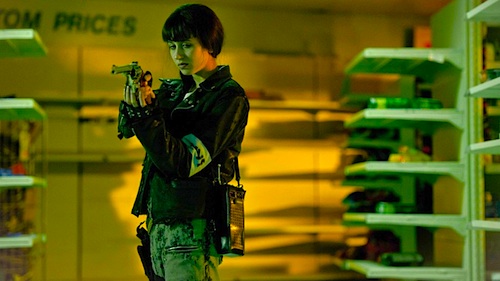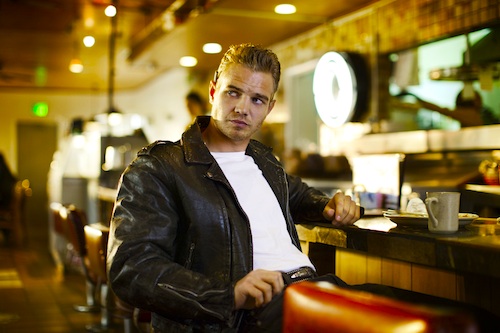By Joe Bendel. Can a play from the 1940’s, based on classical mythology, still speak to contemporary audiences? Alain Resnais will answer in the affirmative. As a consummate cinematic game-player, he naturally stacks the deck, casting a who’s who of French thespians in his meta-adaptation of Jean Anouilh’s Eurydice. Regardless, the star-crossed love still resonates in You Ain’t Seen Nothin’ Yet, which opens this Friday in New York.
Orpheus and Eurydice supply the back bone of YASNY, but the framing device incorporates Anouilh’s Cher Antoine ou l’amour Rate. Playing themselves, the leading lights of French stage and screen are summoned to a memorial for their dear departed friend, playwright Antoine d’Anthac. As part of the ceremony, they are to watch a video of his/Anouilh’s Eurydice, to determine whether the avant-garde revival is worth staging. It is a work they are all familiar with, having each appeared in previous productions. Watching the screen, they get caught up in the story and their own memories and begin to act out Eurydice in concert with the recorded rehearsal.
 Cast members overlap and echo each other, but Resnais always maintains the integrity of Eurydice’s storyline. It all sounds very post-modern, but it is really a case of the narrative overpowering its meta-conceits rather than being defined by them.
Cast members overlap and echo each other, but Resnais always maintains the integrity of Eurydice’s storyline. It all sounds very post-modern, but it is really a case of the narrative overpowering its meta-conceits rather than being defined by them.
Of course, it is hard to go wrong with YASNY’s cast. While Resnais has three sets of Orpheus and Eurydice at his disposal, he clearly favors Pierre Arditi and Sabine Azéma (two of his longtime collaborators), with good reason. Watching this couple on the late side of middle age portraying the doomed young lovers is eerily moving. Their experienced faces seem to amplify the tragedy rather than distract from it. Nonetheless, Anne Consigny’s Eurydice is exquisitely brittle and dignified, overshadowing the aloof Lambert Wilson.
Former Bond villain Mathieu Amalric exudes a deliciously Mephistophelean vibe while maintaining the moral ambiguity of Monsieur Henri, death’s avatar, a role he mostly has to himself. Michel Piccoli nicely anchors the film with his warm gravitas, ostensibly revisiting the role of Orpheus’s father, while leading the cheering section within the elite audience. In addition to playing d’Anthac with eccentric flair, Denis Podalydès (from the Comédie Française) was recruited to direct the hipster Eurydice video segments, further complicating notions of what the film is and who is its author. It is Anouilh’s Eurydice, as well as d’Anthac’s, but it is also partially Cher Antoine, mostly reconceived by Resnais, but also shaped by Podalydès.
The key point is: it’s all good. With its cast members handing off their batons like relay runners, YASNY’s affection for the theater’s passion and artifice becomes infectious. Featuring music by X-Files composer Mark Snow and Eric Gautier’s richly noir-ish cinematography, it is an unusually elegant film. Cerebral yet strangely poignant, the highly recommended You Ain’t Seen Nothin’ Yet opens this Friday (6/7) in New York at the Quad Cinema.
LFM GRADE: A-
Posted on June 3rd, 2013 at 1:04pm.


